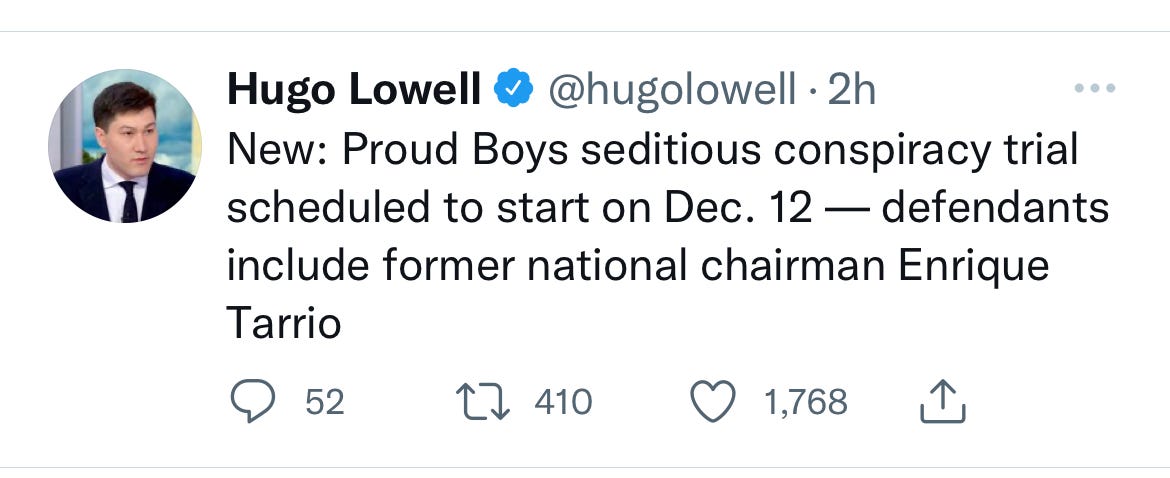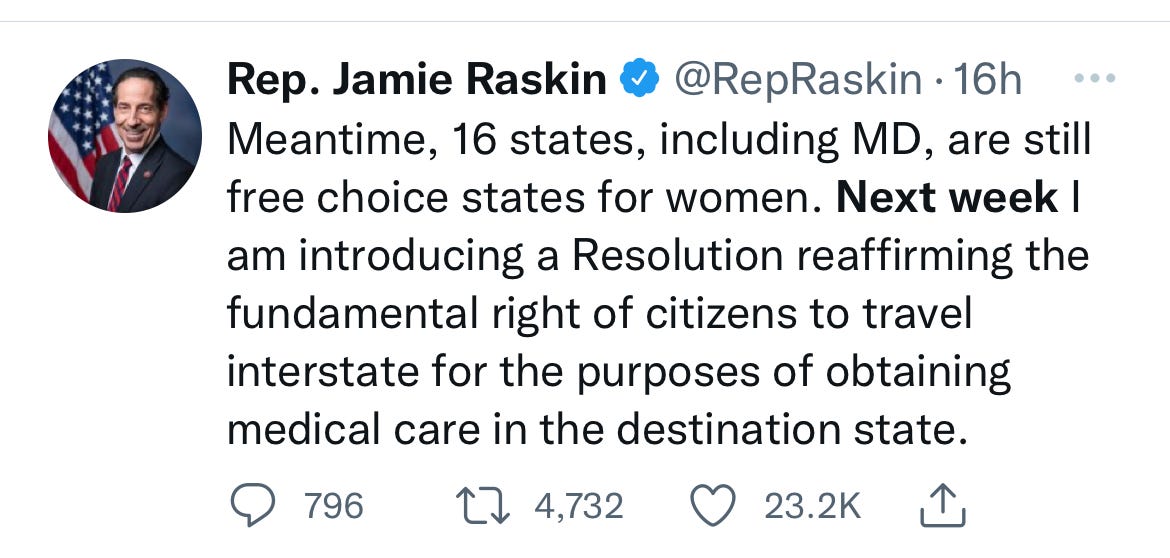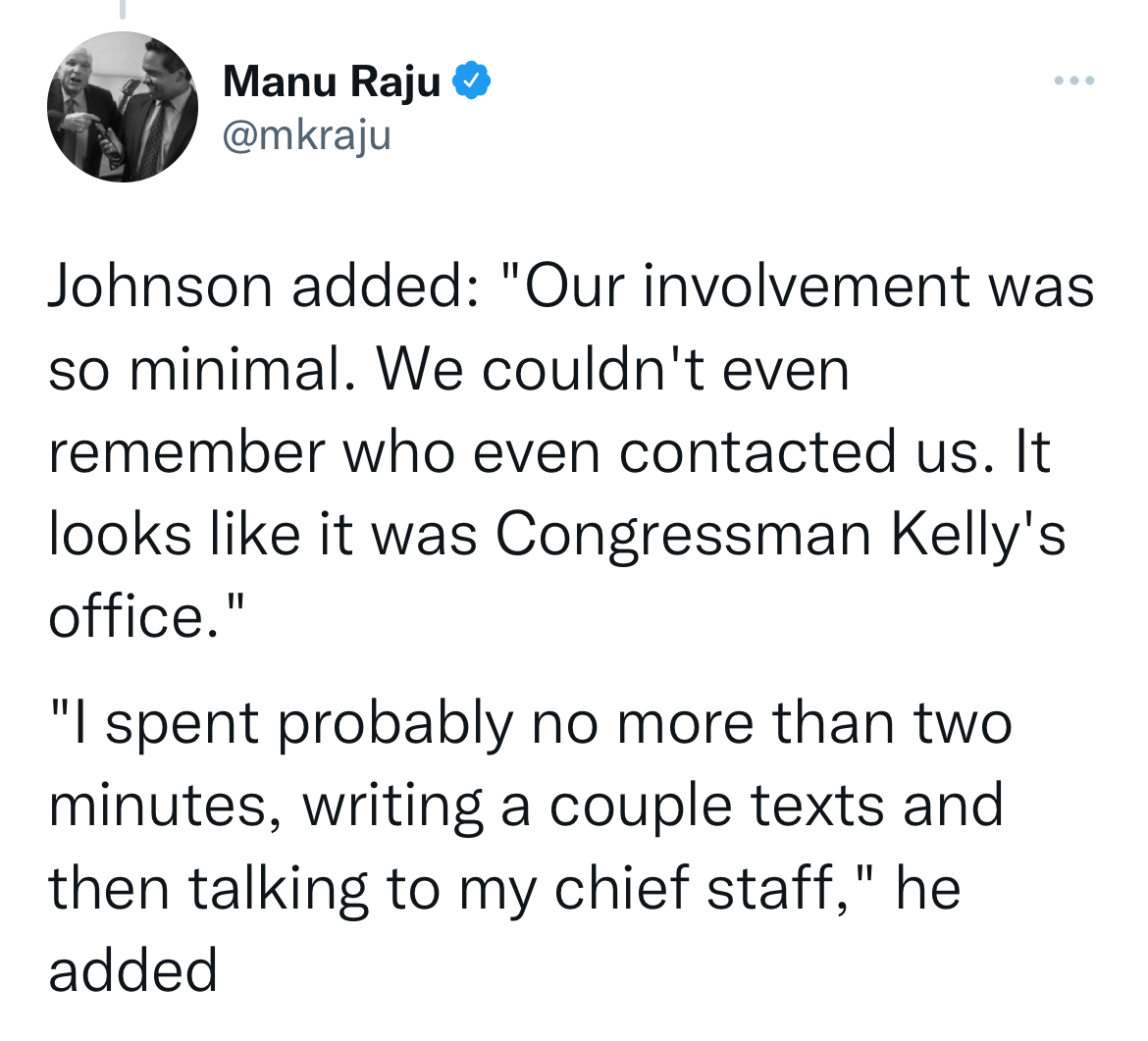One of my hopes for Civil Discourse is that I’ll have a few minutes most Sunday evenings to send you some notes on the week ahead — what to look for, what you’ll need to know to process it, etc. I dislike being in a reactive mode, where things jump at you from out of nowhere and you’re always trying to catch up. So this will be my effort to flag what’s coming and help us start to look through the issues in advance. [It’s also a great opportunity to share video of our chicks, Mavis and Barney, who are going through an early molt and look frighteningly like vultures, although they’re as sweet as pie.]
First off, what won’t happen this week: January 6 committee hearings. Those plans have been canceled and the remaining hearings will likely take place in July. This isn’t a bad thing. The Committee, flush with success, is taking in new evidence. And just like you don’t dump raw data out and expect people to make sense of it, it’s important for the committee to interview new witnesses, assess their evidence, and assemble it in a narrative with other evidence that makes the full story accessible.
What’s important during the break? We can’t let the committee’s work drop off of our radar screen. It would be easy to let that happen. Losing Roe is an event of such enormous proportions that it’s taken our collective breath away. Make sure you have bandwidth to continue to talk with friends about the committee’s work. It’s important to share what we’re learning and help people who may not have had the chance to follow as closely to appreciate that there is evidence that it’s worth their time to take a look at that strongly suggests Trump knew he’d lost the election and nonetheless dragged the country through the agony of the big lie and the insurrection. The country will be better off with an informed electorate make choices in primary and midterm elections this year and into the future.
1. We’re back on Supreme Court watch this week. The Court still has West Virginia v. the Environmental Protection Agency to decide, a case that involves how much authority the EPA has to regulate greenhouse gas emissions from power plants.
Background: it’s very confusing! Let’s break down how the case got to the Supreme Court in steps, to help us understand what the impact of the decision might be.
In 2016, the Supreme Court halted an Obama administration plan to require energy producers to transition away from burning coal to lower CO2-emitting natural gas. (In an unusual move, SCOTUS made its decision before the plan was reviewed by a court of appeals.)
Once Trump was in office, the EPA repealed the Obama plan in favor of a rule that was far less climate-friendly, merely requiring power plants to upgrade their coal burning equipment.
Then, as President Biden was about to be inaugurated (and while your attention was undoubtedly distracted), the D.C. Court of Appeals struck down Trump’s rule and said the EPA couldn’t revoke the Obama-era plan, because it relied “on a mistaken reading” of the law in question, the Clean Air Act.” Are you with me so far?
Biden’s EPA advised the court it wasn’t going to go back to the Obama plan — market forces had already incentivized power companies to meet the emissions targets. So, the court stayed its order, giving the Biden EPA the opportunity to come up with its own new rule.
But before they could do anything, a group of coal companies and Republican state attorneys general asked the Supreme Court to review the DC Circuit’s decision that rejected the Trump EPA’s plan. Their goal was to prevent the EPA from reviving a version of the Obama plan, the same one the Biden administration had already told the court they didn’t plan to resurrect.
So yes, it’s a bit confusing that the Supreme Court would even hear the case, since the issue the companies and attorneys general wanted them to decide seems to be off the table. That’s exactly why this case has concerned people. This case is about how much power administrative agencies have and there was no real reason for the court to hear it, signaling an intent among a significant portion of the justices to “do something.”
If the Court doesn’t use some kind of procedural off ramp (like declining to decide an issue that’s moot) to get out of the case, and actually decides the substantive legal issue, it will be determining whether the Clean Air Act only permits the EPA to regulate how power plant operates (what the Trump plan does) or whether the EPA can use incentives and targets to force the industry to transition away from burning coal to a fuel that does less damage to the environment (the Obama plan).
This decision about the EPA’s administrative authority has much broader implications for all of government. This case is really about conservatives dislike of what the call “the nanny state” and their belief that government shouldn’t intrude too much into our lives in too many beneficial ways (you’ll forgive my characterization, it’s been a long week.)
The goal the GOP AG’s have here, is to make it more difficult for agencies like EPA and those that work in areas including public health and the economy to exercise regulatory authority. They’ve invoked the “major questions doctrine,” which says Congress has to make a clear statement before an agency can make “decisions of vast economic and political significance.” Since Congress isn’t usually particularly clear when it comes to agency powers, the AG group’s goal is to neuter administrative agencies, for instance, here, the EPA’s ability to address climate change.
Interesting note, the major questions doctrine is not something that’s applied very frequently. But SCOTUS used it twice last year, once to lift the federal ban on evictions during the pandemic and the second time to block the vaccine mandate for employers. So you get the drift of where this is headed. The Court could have just declined to hear this case since the Biden administration’s doesn’t intend to reinstate the Obama era policy. And the Supreme Court isn’t supposed to give advisory opinions on hypothetical issues. So it seems likely, especially given this court’s last two outings with the major questions doctrine, that we could have more bad news from the Court in the week ahead.
2. Jan 6 cases? On Monday, there’s a plea hearing for Tim Boughner, of Michigan. He’s accused of assaulting police with chemical spray and a bike rack. You can read DOJ’s statement of facts against Boughner here. We’ll learn tomorrow if he is going to cooperate. And if you’re ever interested in looking up a specific defendant DOJ has already charged, there’s a long list of all of them, with the status of the case and links to key pleadings here.
The Proud Boys seditious conspiracy trial is now set to start on December 12, so after the midterms. Expect some intrigue along the way, probably pretrial motions about what evidence is admissible and whether the defendants’ rights have been prejudiced by the committee hearings. And let the flipping begin. As trial gets closer, some of these folks are going to want a deal. And prosecutors are likely interested in credible evidence that helps them get inside of the Willard Hotel war rooms being run by Trump stalwarts like Roger Stone, Rudy Giuliani and Mike Flynn.
3. A legislative note on abortion: One of the next litigation frontiers will involve efforts by states that prohibit abortion to make life still more difficult for their residents. At the extreme, we could see prosecutions of people who travel across state lines and those who help them, to obtain abortion-related medical care. Maryland Rep. Jamie Raskin says he will offer a bill that would prevent states (like my own state, Alabama) from suing or prosecuting their residents. It’s unlikely to have much life in the Senate (although who knows, Republicans may find the prospect of letting a state have extraterritorial criminal powers too much, even for them. Democratic states could bounce back with laws that impact, say, firearms) but it’s important to surface this issue and create public awareness and understanding of just how broadly Dobbs may impact the ability of pregnant people to obtain needed and even life-saving medical care. In a release last week, AG Merrick Garland vowed to aggressively protect the rights of Americans to travel to a different state to receive an abortion and the first amendment rights of people to discuss and advice others of the availability of that care.
4. Ghislaine Maxwell, convicted of recruiting and grooming teenage girls for sexual encounters with Jeffrey Epstein, faces sentencing on Tuesday. There may be some delay because prison officials have placed her on suicide watch (Epstein committed suicide while awaiting sentencing in prison), which her lawyers argue interferes with their ability to prepare for the hearing. At least two of her accusers are expected to speak and others may submit victim impact statements to be read in court. Victims of a crime have a right to speak at sentencing under the Crime Victims’ Rights Act.
The lingering question here has always been whether Maxwell might provide information she has about other people involved in Epstein’s sex-trafficking operations. For some defendants, hearing their judge pronounce the sentence of years they’re going to spend in prison in open court is the incentive they need, but Maxwell, at least so far, has seemed steadfastly uninterested in cooperation.
***
That’s it for this Sunday other than a little random musing:
Could we learn the truth (or at least more of it) about Wisconsin’s Republican Senator Ron Johnson this week? First he blamed the intern whose name he couldn’t remember, then he blamed Pennsylvania Congressman Mike Kelly (who promptly denied it), but it looks like there’s more to the story about how one of his aide’s ended up pressing one of Mike Pence’s aides to let the VP accept a slate of Republicans impersonating actual electors ahead of the vote certification. Maybe we’ll find out this week. Johnson’s hometown paper has this update.
And, Matt Gaetz. What about Matt Gaetz? Everyone once in a while I wake up and wonder if today is the day a Florida grand jury will indict the Congressman. We still don’t know if DOJ has a case on him. But as we get closer to the Florida primary on August 23, it gets less likely that he will be indicted, if he’s going to be, before the midterms. Remember, DOJ policy calls for it to avoid influencing the outcome of elections (at least good DOJ administrations do), so if they're not ready to go by the end of this week, even if they’ve got a good case on Gaetz, we likely won't see it until after the November election.
—That’s it for the coming week. If it’s like the last few, I’m sure all sort of unpredictable crazy will pop up. But I hope this leaves you feeling a little bit more prepared.
We’re in this together.
Joyce








Share this post